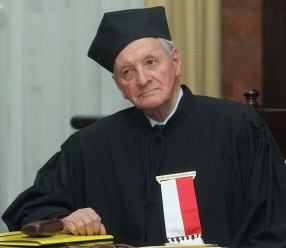Andrzej Bogusławski facts for kids
Quick facts for kids
Andrzej Stanisław Bogusławski
|
|
|---|---|

Professor Andrzej Bogusławski in 2012
|
|
| Born | 1 December 1931 |
| Nationality | Polish |
| Awards | Commander's Cross with Star of the Order of Polonia Restituta Doctor Honoris Causa, University of Torun |
| Scientific career | |
| Fields | Epistemology of language Grammar Lexicography Linguistics Russian language Semantics Semiotics Theory of language |
| Institutions | University of Warsaw Polish Academy of Learning Polish Academy of Sciences Warsaw Scientific Society, University of Oldenburg |
Andrzej Stanisław Bogusławski (born 1 December 1931) is a famous Polish expert in language. He studies how language works, what words mean, and how we use them to understand the world. He is known around the world for his ideas.
He first studied the Russian language. Later, he became interested in how language helps us know things and how it is built. He is now a professor who has retired from the University of Warsaw.
Contents
Life and Work
Andrzej Bogusławski spent his career studying language. He became an important member of groups like the Polish Academy of Sciences and the Polish Academy of Learning. These groups are made up of smart people who help advance knowledge in Poland. He also led the Formal Linguistics department at University of Warsaw for many years.
Standing Up for What's Right
In 1981, a difficult time began in Poland called martial law in Poland. This meant the army took control of the country. On December 13, 1981, Andrzej Bogusławski was arrested. He was held because he refused to sign a paper saying he would be loyal to the new government. Many smart people from around the world, like Noam Chomsky, asked for him to be set free. He was released on July 16, 1982.
Understanding Language
Bogusławski has explored many parts of language. He looked at how dictionaries are made (lexicography) and how sentences are put together (grammar). He also studied what words truly mean (semantics) and how signs and symbols work (semiotics).
He worked with another famous language expert, Anna Wierzbicka. Together, they explored how to describe meanings using simple, basic words. He also helped bring back an old idea from a thinker named Gottfried Wilhelm Leibniz. This idea was about an "alphabet of human thought," which means finding the basic building blocks of how we think and speak.
Andrzej Bogusławski is a top expert in how language works, especially for Indo-European languages, like Slavic languages. He has helped create new ways to study language. He also looks at how language connects with philosophy, which is about big questions like what is real or how we know things.
Awards and Recognition
Andrzej Bogusławski has received many honors for his important work.
- In 2001, a special book called a Festschrift was made for him to celebrate his 70th birthday. It included writings from other scholars.
- In 2003, he received a high award from Poland called the Commander's Cross with Star of the Order of Polonia Restituta.
- On May 16, 2012, the University of Torun gave him an Honorary doctorate. This is a special degree given to people who have done great things.
His Publications
Andrzej Bogusławski has written over 400 books and articles. He also helped create a large Polish-Russian and Russian-Polish dictionary. His works are published in Polish, Russian, and English.
Selected Books
- Bogusławski, Andrzej (2023). Metodologia lingwistyki. Zarys. Warsaw: Wydawnictwa Uniwersytetu Warszawskiego. ISBN: 978-83-235-8353-0.
- Bogusławski, Andrzej (2010). Dwa studia z teorii fleksji (i inne przyczynki). Warsaw: Bel Studio. ISBN: 978-83-61208-46-4.
- Bogusławski, Andrzej (2007). A study in the linguistics-philosophy interface. Warsaw: BEL Studio. ISBN: 978-83-89968-80-7.
- Science as Linguistic Activity, Linguistics as Scientific Activity, Warsaw 1998.
- Sprawy słowa = Word matters, Warsaw 1994.
- Ilustrowany słownik rosyjsko-polski, polsko-rosyjski, t. 1–2, Warsaw 1978.

